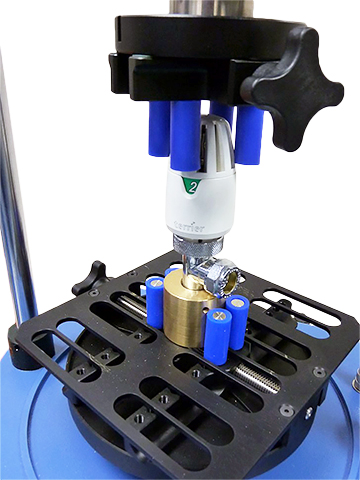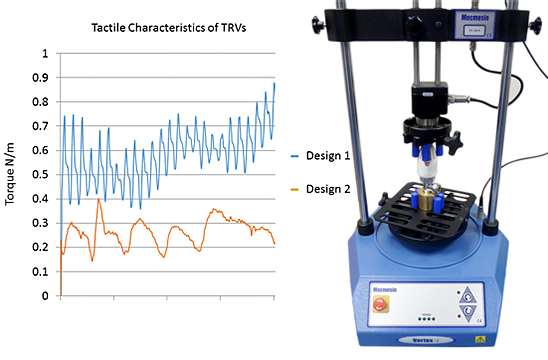
TRV undergoing torque to turn testing on the Vortex
Pegler Yorkshire is one of the world’s leading manufacturers of advanced integrated plumbing and heating products. The company was established in the 1890’s and its dedication to quality, engineering innovation and customer service continues today as the organisation tackles the challenges of energy and water conservation in its advanced product design and development projects. In the drive to continue to be class-leading in quality, durability and customer satisfaction, the New Product Development department sought to leverage their expertise in the subjective assessment of the optimal tactile characteristics of their Thermostatic Radiator Valve (TRV) products. TRVs mount onto central heating radiators to control room temperature and turning the TRV by hand either increases or decreases the temperature setting. The integral thermostatic component regulates the flow of hot water through the radiator to maintain the desired ambient temperature. An objective methodology to repeatably measure the torque to turn characteristics of the rotational control was required.

TRV undergoing torque to turn testing on the Vortex
Mecmesin supplied a Vortex-i computer-controlled torque test system and a selection of fixtures and accessories to grip a range of different valve geometries. A representative benchmark test rotates the TRV from the minimum temperature setting to maximum temperature and returns to minimum again. The graphical results clearly show the changing torque level for this full-range angular cycle test, which can be correlated to the engineer’s knowledge of preferred ergonomic characteristics and feel. EmperorTM software enables the curves for alternative samples to be overlaid for comparison; this analysis providing valuable feedback for iterative design and manufacturing optimisation. The comprehensive programming capability also allows NPD to write custom test programs configured to their specific requirements—to incorporate unique experience into each product. The ability to change loadcells also provides the flexibility to maintain the proven accuracy of the results for future designs with necessarily different torque values.
“Tactile characteristics have become a very important aspect in TRV design. The Vortex-i has enabled Pegler Yorkshire to benchmark and assess new design proposals allowing detailed examination of dynamic characteristics and wear over prolonged use. As a result we can provide customers with TRVs of an increased quality and durability.”
Sam White, New Product Development Design Engineer
Pegler Yorkshire